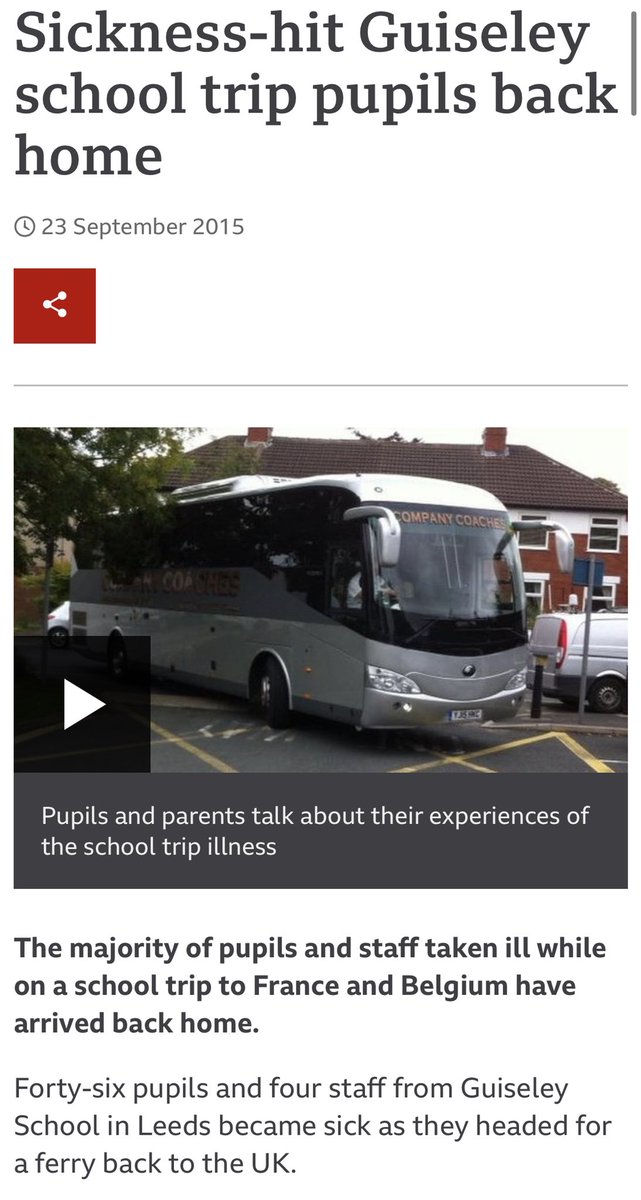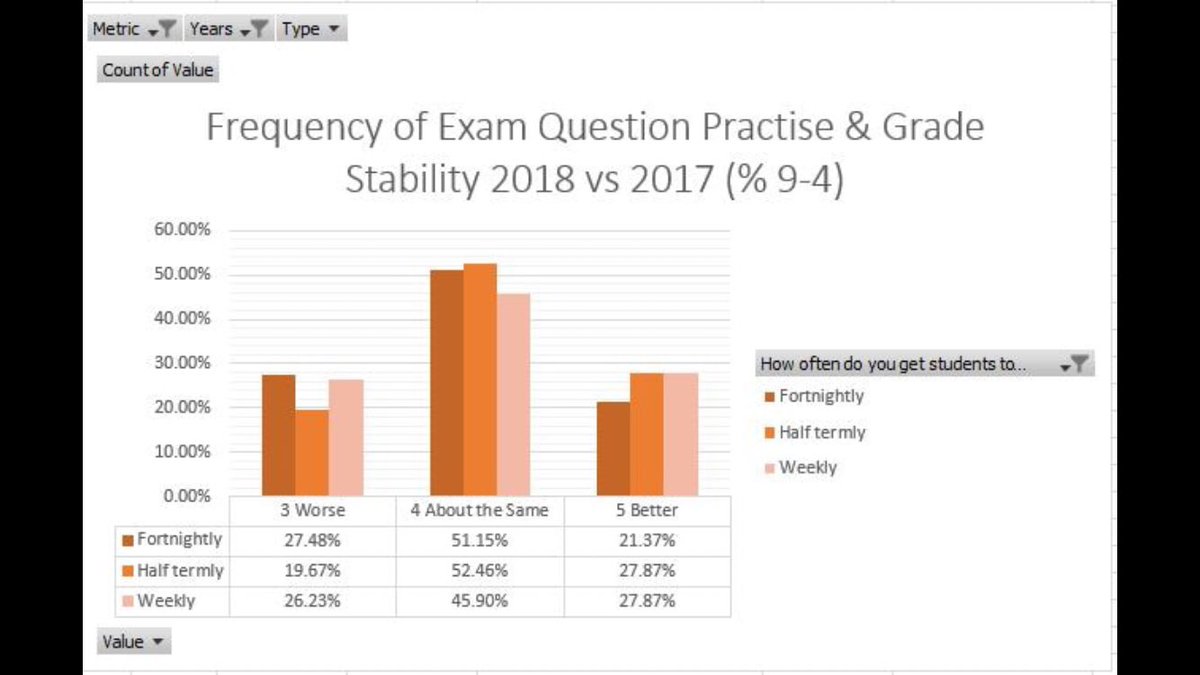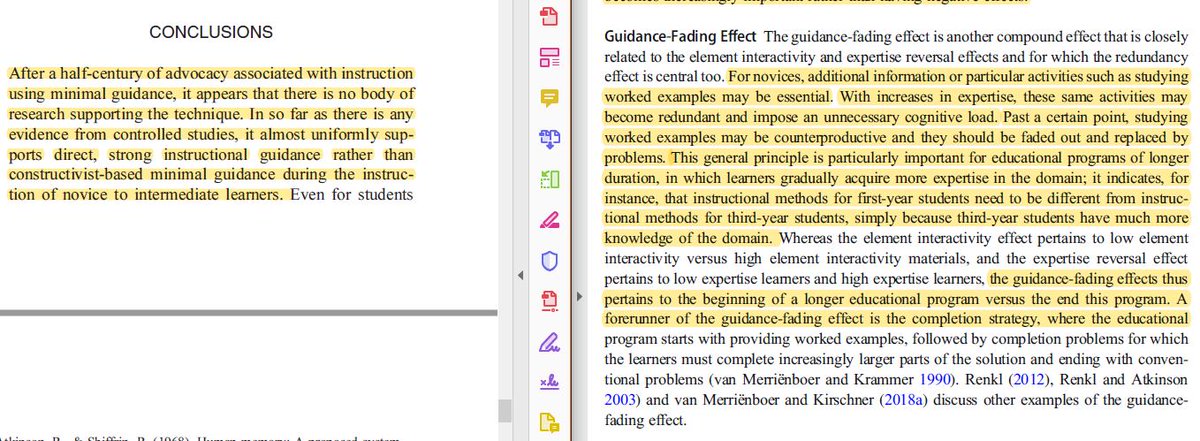
So a few years ago I took a Y11 battlefields trip to France and Belgium. 80 children, 8 staff. They were a lovely group. We had a great trip. Then, on the final day, the coach driver started feeling a bit odd. Then a couple of students started feeling a bit under the weather...
https://twitter.com/scottpughsley/status/1353768852954484737
When we had a final trip to Ypres to stock up on chocolate, two children sat with the staff to recover. All went ok. We loaded up the coaches and set off for the ferry port. On the way, the one of the two children was sick. Before long, the second was too. 



Half an hour into the journey, five children had vomited. Then I got a call from the other coach. Chaos. More vomiting children and one member of staff down too. By the time we got to the ferry port, a dozen people flopped out of the coaches to lie on the grass.
I ran ahead into the ferry port to see if they had a doctor, or could at least get us boarded. Not good news. We were told to wait until everyone else was on board. Then the news was broken: no trip for us until the company physician had assessed this situation.
As I frantically rang around to school (brilliant) and the insurance co (useless), the ferry departed. The children were brought into the terminal. 1 half became a nursing station for the now 20 children and staff who were suffering. The other 60 were getting worried...and hungry
After a couple of hours we were running out of options. The Zeebrugge ferry had sailed, Calais refused to take us and we had no driver to get there anyway. The insurance company suggested I call back in the morning!! Finally the doctor arrived.
After a brief examination of a few students, alongside a teacher chaperone, the doc concluded that this was some kind of viral outbreak. By this point, even more students were vomiting and staff still standing were using bin bags purchased at a supermarket to run between crises.
The poor children were increasingly terrified. We were very lucky they were so sensible, but it was a mammoth task to be reassuring. In the end it was all about being normal: “quick head count in counting groups.”, “have you had a drink recently?”, “please put some shoes on!” Etc
Later students noted that these “normal” bits helped them feel calmer. Routines matter!
We had just managed a whole group announcement in this vein when the blue lights and sirens appeared.
We had just managed a whole group announcement in this vein when the blue lights and sirens appeared.
A few minutes later the terminal was filled with police and paramedics in respirators wheeling trollies. Even the coast guard turned up. Then they starter loading children onto trollies. I physically had to block the door way so someone would tell me where they were going.
In a whirlwind half hour, 41 students, 4 staff and 1 driver were taken off, in respirators, in a fleet of ambulances, to hospitals all over Belgium. By the end of all this the remaining staff and students were left slightly dazed in the ferry terminal. 

At this point the coast guard took over. A local hostel has been commandeered and the remaining children were loaded onto a coach, whilst the coast guard explained that this was part of Belgium’s national emergency response protocol and not to worry .... I was definitely worried.
To get ahead of the coaches, I was driven at high speed in a police car to the hostel. When we arrived the Red Cross were setting up ready to receive students. If you ever doubt the paperwork you do for a school trip, remember this! The trip folder was my lifeline.
The coach arrived a few minutes later and children were registered, billeted and fed. By this point it must have been around 11pm. My phone was going bonkers with calls from school who were trying to keep parents informed.
My three remaining staff were being ferried around by the police to visit pupils in nearby hospitals, meanwhile a poor (but thankfully brilliant) NQT and me were left with managing the hostel group. We took it in turns to sleep and to begin tracing all the students in hospitals.
By about 4 am we had finally got a full list of every child, where they were and what their condition was like. We did one last check in on the children who were still with us and then tried to rest. I think we managed an hour. 

The next morning, the cavalry arrived. School, seeing how things had been going, had despatched two members of staff to rendezvous with us. I have never been happier to see a member of SLT! By that point I had made 214 phone calls.
Mercifully most students seemed to be recovering and by the time breakfast was over, a few had even started to drip back into the hostel. This did a lot to reassure those who had not been ill that the world was not about to end.
Much of this day was spent trying to fend off the press and to arrange passage back to the UK. We were given a return crossing but three students had still not been released from hospital as the 5pm departure approached. I rang again and was told they were being kept in. 

The bulk of students, dazed and confused, headed for home with the remainder of the staff. Meanwhile I stayed on to chaperone the three. That evening I went to the small, rural hospital where the 3 had been placed to allow them to speak to their parents. 

That evening I had to go aback to the hostel. Nobody was there so I ended up walking 4 miles to a roadside restaurant I found on google maps. I was the only person in. It goes down as one of the most surreal meals I’ve ever eaten. I couldn’t sleep.
The next morning brought better news. The children were recovering but we had no transport and no easy way to get home. Finally the insurance company suggested I book a flight. This involved a trip to Brussels. The hostel owner booked me a taxi for the 100 mile trip!
I have no idea what kind of taxi company it was. What followed was the most expensive (£440) and most surreal taxi ride ever. Bumping along in a Subaru Impreza WRX with 3 very pale students, who were not appreciating the exhaust note, to Brussels airport.
Finally we were able to board a flight and head back home. My last task was driving each pupil back to their family, before going home to sleep! I thought I would get parental complaints due to the confused communication but parents were so supportive. 



It’s definitely the hardest school trip I’ve ever run, but strangely the best in some ways too. It certainly cemented friendships and it brought that year group together.
Oh and I never complain about risk assessment any more.
Oh and I never complain about risk assessment any more.

• • •
Missing some Tweet in this thread? You can try to
force a refresh









